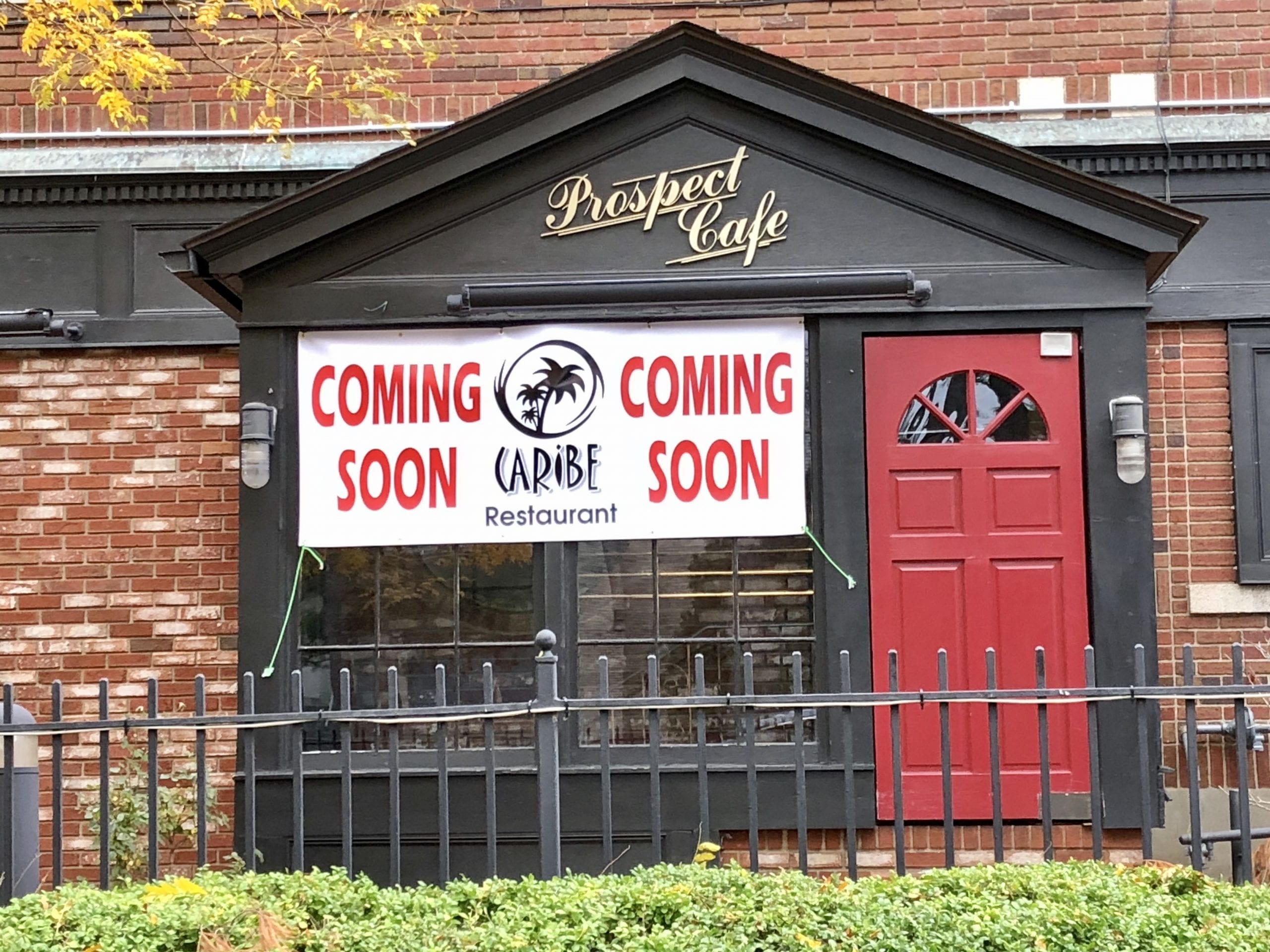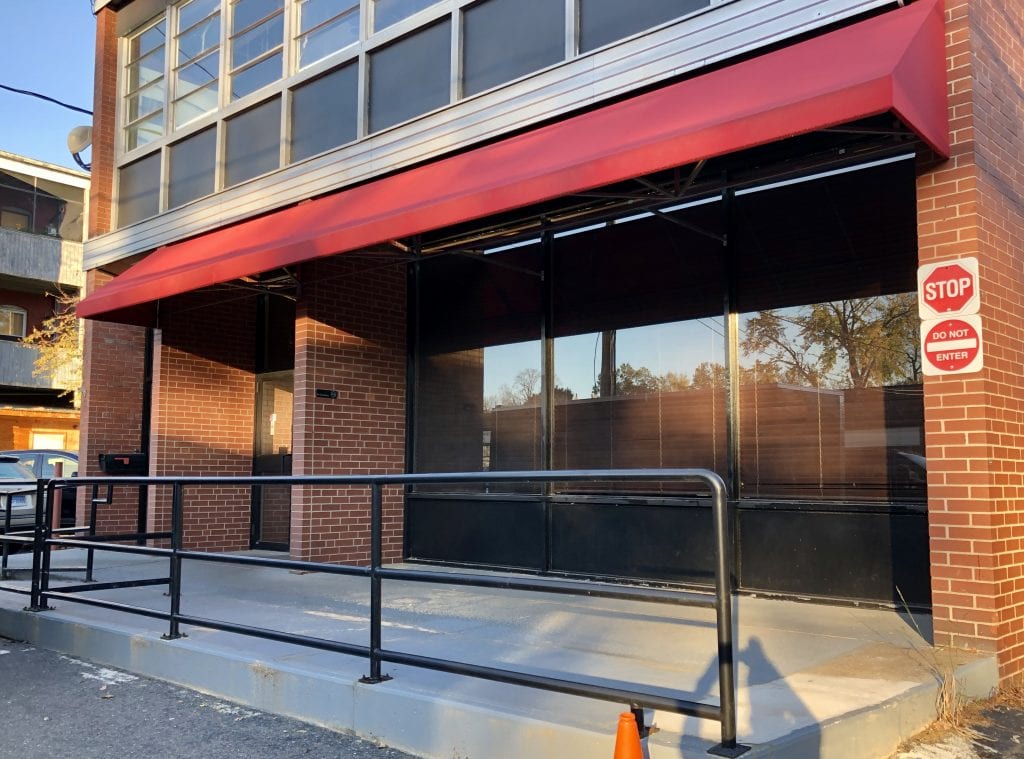Uncertainty the Enemy for Connecticut’s Beleaguered Businesses

Audio By Carbonatix

At the corner of Prospect Avenue and Park Road in West Hartford, the Prospect Cafe closed in the fall, but Caribe is planning to open in the space in December. Photo credit: Ronni Newton
While some West Hartford businesses, including restaurants, have closed amid the COVID-19 pandemic, several new restaurants are already planning to open in the recently-vacated spaces.
By Hugh McQuaid, CTNewsJunkie.com
The coronavirus has dealt Connecticut businesses of every shape and size a tough year. Although it is hard to say how many operations closed, some are weighing whether to remain open if Congress does not pass more federal relief soon.
It is difficult to put a number on just how punishing the pandemic has been on the state’s businesses as a whole. Last month, the Connecticut Restaurant Association estimated that more than 600 restaurants have closed their doors with no immediate plans to reopen.
There is no easy way to similarly quantify the impact on the full spectrum of businesses.
Although the Secretary of the State’s Office maintains a registry of businesses, the database is largely unhelpful because it includes all the limited liability corporations in the state and businesses often fail to report when they close, a spokesman said. Tax records often fail to “draw a straight line” to a closed business due to slow reporting and overlapping tax types, a spokesman at the Department of Revenue Services said.
Meanwhile, the state Department of Economic and Community Development does not track the opening and closing of businesses.
But there is some hard evidence of the disruption the pandemic has caused for businesses. The Department of Labor tracks instances where businesses with more than 100 full-time employees have reported “employment loss,” location closures or mass layoffs. The reporting is required under the federal Worker Adjustment and Retraining Notification Act and could be minor, as in a temporary furlough, or major like mass layoffs.
So far this year, the DOL has logged 121 such notices. That’s nearly five times the 25 reports the department handled in all of 2019.
It has been a challenging year for businesses that look for a sense of certainty in good times and bad, Chris DiPentima, president and CEO of the Connecticut Business and Industry Association, said Tuesday.
“This has been a very, very uncertain time,” he said. “Not just the uncertainty of when the economy will turn around, but the uncertainty of ‘Will my industry be shut down with 24-48 hours notice?’”
Connecticut’s economy has been in various stages of open and closed since the state asked residents to stay home in March with the exception of “essential businesses.” Gov. Ned Lamont first enacted tight public health restrictions aimed at slowing the spread of the COVID-19 virus, then eased them throughout the warmer months, allowing commerce to rev up as infection rates dropped. As colder weather has returned, virus cases have spiked and the governor has been tightening capacity limits on businesses.
In recent weeks, as hospitals have seen climbing COVID-related admissions, Lamont sometimes seemed close to shutting down gyms and indoor dining at restaurants, a move which some doctors have called for. But the governor has so far resisted taking that step and has not offered a clear metric for what might trigger it.
“I could shut down schools, shut down restaurants, lock everything up and say let’s come back in the new year, but you’ve got to get the right balance going forward. I think we’ve got a good balance right now but we could always change course if we had to,” he said Monday.
Although almost certainly preferable to closure, that very flexibility leaves some industries in limbo, uncertain of what to plan for. The issue came up during a Tuesday virtual meeting between Lt. Gov. Susan Bysiewicz and business owners who have launched their operations during this turbulent year.

The former Park & Oak space at 14-16 Oakwood Ave., is already home to Loco Urban Street Food and will soon also be Toro Tavernia. Photo credit: Ronni Newton (we-ha.com file photo)
During the meeting, Bob Chicoine, co-owner of Dockside Brewery in Milford, said his company reinvested money made over the summer to continue to support dining over the colder months. They have enclosed an outdoor deck, purchased patio igloos and a tent with heaters, he said.
“The biggest challenge right now is, are we going to stay open?” he asked. “That’s the balance. We’re reinvesting capital to be open and we just don’t know if we’re going to be open. Right now we still have 50 employees and we love them all.”
The Connecticut Restaurant Association inked a letter Tuesday to Lamont asking him to allow indoor dining at restaurants to continue.
Chicoine is not alone in trying to plan for a winter with too many unknowns. Perhaps the biggest source of uncertainty for businesses of every stripe is whether they can expect an influx of federal aid from a seemingly deadlocked Congress.
Federal aid from the pandemic relief act carried many businesses through the worst of the first wave of the virus. The Paycheck Protection Program provided forgivable loans to keep employees on the payroll and helped to pay rent, utilities and interest on mortgages.
For months, Congress has been negotiating a second round of stimulus funding but it is unclear whether Republicans and Democrats will arrive at a consensus before the end of the year.
DiPentima said many Connecticut businesses are watching the negotiations closely, hoping Congress passes something soon. Some owners are likely making a calculation, trying to determine whether it is worth trying to stay open through the winter if relief isn’t coming soon, he said.
“Do I stay open right now and just power through this, most likely incurring business losses, thinking that federal relief will be here in the next 30 days?” DiPentima said some owners are asking. Or,“Do I just temporarily shut down now and weather through this bad time and then when the vaccine is out and loans are out from the federal government, reopen my business?”
Asked about the federal negotiations Monday, the governor urged his fellow Democrats in Washington to set aside sticking points and make a deal with Republicans on areas where both sides agree.
“Look, let’s take something. Let’s get going, at least the medical piece of this thing and the small business piece, places where we can agree and then we’ll live to fight another day. Make a deal,” Lamont said.
Republished with permission from CTNewsJunkie.com, all rights reserved.
Like what you see here? Click here to subscribe to We-Ha’s newsletter so you’ll always be in the know about what’s happening in West Hartford! Click the blue button below to become a supporter of We-Ha.com and our efforts to continue producing quality journalism.



